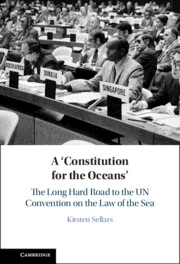Book contents
- A ‘Constitution for the Oceans’
- A ‘Constitution for the Oceans’
- Copyright page
- Contents
- Foreword
- Abbreviations
- 1 End of the Old Order
- 2 Old Freedoms, New Rights
- 3 North, South, East and West
- 4 A Conference Collapses
- 5 Internationalising the Seabed
- 6 Passage through Straits
- 7 The Archipelagic Concept
- 8 New International Orders
- 9 The Bitter End
- Afterword
- Bibliography
- Index
3 - North, South, East and West
New Ideas and New Actors at the 1958 Conference
Published online by Cambridge University Press: 06 February 2025
- A ‘Constitution for the Oceans’
- A ‘Constitution for the Oceans’
- Copyright page
- Contents
- Foreword
- Abbreviations
- 1 End of the Old Order
- 2 Old Freedoms, New Rights
- 3 North, South, East and West
- 4 A Conference Collapses
- 5 Internationalising the Seabed
- 6 Passage through Straits
- 7 The Archipelagic Concept
- 8 New International Orders
- 9 The Bitter End
- Afterword
- Bibliography
- Index
Summary
In the late 1940s, the Americans and the British made unilateral claims to continental shelves and fishing conservation zones, but tried to apply the brakes to further claims when other countries followed suit. The International Law Commission was given the task of producing draft articles to guide negotiations over a single law of the sea convention, which, they hoped, would rein in future claims. A conference was convened in 1958 under the auspices of the United Nations, at which the essential question, preceding all others, was the breadth of the territorial sea – ‘the base of the pyramid’, one delegate said – on which all other claims stood. Novel concepts were also addressed, such as the continental shelf and the exploitability criterion, the existence of a ‘genuine link’ between ship and state, and the abstention policy relating to high seas fishing. The conference drafted what would become five separate conventions, on the territorial sea and contiguous zone, the high seas, high seas fishing, the continental shelf, plus a protocol on dispute settlement. Yet in the end it failed, as had its predecessor in 1930, to settle the breadth of the territorial sea.
Keywords
- Type
- Chapter
- Information
- A ‘Constitution for the Oceans'The Long Hard Road to the UN Convention on the Law of the Sea, pp. 66 - 106Publisher: Cambridge University PressPrint publication year: 2025

